When was the last time that you asked your friends for referrals on restaurants and retail stores?
We bet that it wasn’t that long ago. Word-of-mouth referrals are trusted by 86% of consumers, making it the most trusted form of marketing.
After all, we trust our friends and family the most. We use their advice and experiences to guide our purchasing decisions. Alternatively, we also share our consumer experiences and favourite brands as a part of everyday conversations.
Now, how can you use word-of-mouth marketing to grow your business? In our referral marketing 101 guide, you’ll learn everything you need to know about word-of-mouth marketing, how to get started, and tips for launching your referral program.
What is word-of-mouth marketing?
Word-of-mouth marketing, otherwise known as referral marketing, utilises referrals to promote products and services.
This process may occur organically through your brand advocates. These loyal customers love your brand, so they will likely recommend it to their loved ones so they can experience it too. Their influence can help you grow your customer base and score more profits.
ReferralCandy reports that people pay 2x more attention to recommendations from friends. Plus, referred customers bring 25% higher profit margins as compared to non-referred consumers.
The bottom line is: referred customers have a significant impact on your business.
Naturally, people love to share stories about their positive customer experiences. They post photos of dining from their favorite restaurants or hotels on social media. If they’re an expert on a particular industry, they voluntarily share their knowledge with their network.
Likewise, many customers also ask for referrals. Since we want to get the bang for our buck, we prefer tried and tested brands recommended by the people we trust.
So, how can you snag more referrals? The answer is launching a referral program.
How to incentivise referrals?
Referral programs incentives brand advocates to refer your business in exchange for rewards. These rewards include discounts, exclusive products, cash, upgrades, and freebies.
For example, PoundToy’s referral program lets brand advocates and referred friends get a 12% discount on their next purchase.
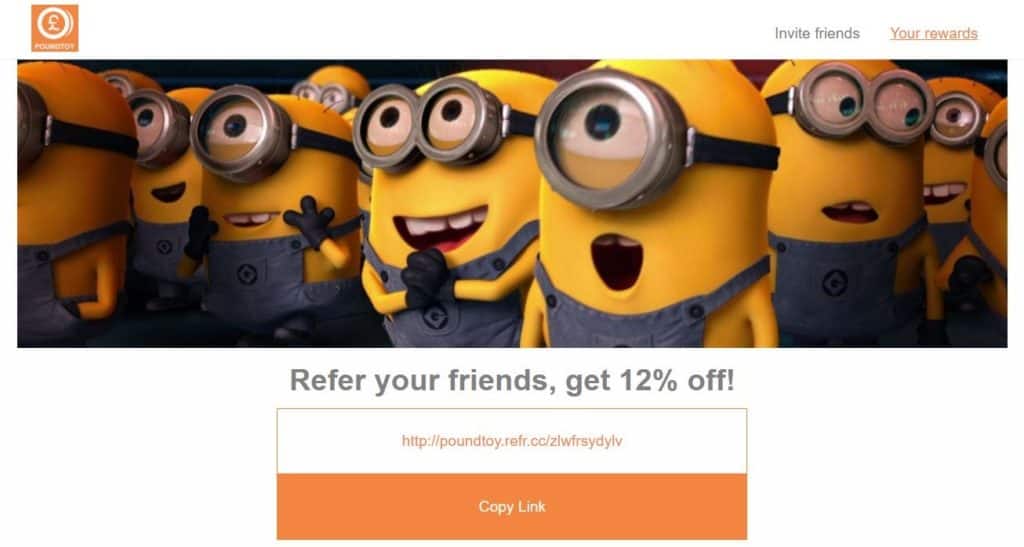
Shortly after its launch, the referral program has become a significant part of the company’s growth.
PoundToy co-founder Rob Owlette says: “We got our first referral sale within an hour of installing. It was everything we were looking for: works with Shopify, contributes a huge amount of revenue every month, does everything we need without having to pay a developer lots of money.”
By providing incentives, businesses can grow their customer base and gain more profits through referrals.
How to adjust your rewards to your customers’ purchasing behavior
Of course, different rewards can have diverse impacts on your customers’ purchasing behavior. Here are some effects of each reward type.
1. Discount = repeat purchases
Businesses in the food or fashion industry regularly find customers returning to their stores to make repeat purchases. If you have a similar business model, coupons are crucial to getting more repeat purchases.
With a discount, customers are encouraged to make their next purchase. Some may even be eager to make a big purchase because of the deal. Not only that, but you also get a new customer with minimal effort.
Ledger – a company specializing in security and cryptocurrency – provides customers with a $25 discount for referring four friends. Consequently, each friend also gets a 20% discount code. Since they have a loyal fanbase to promote their brand, they can focus on providing valuable services to their customers.
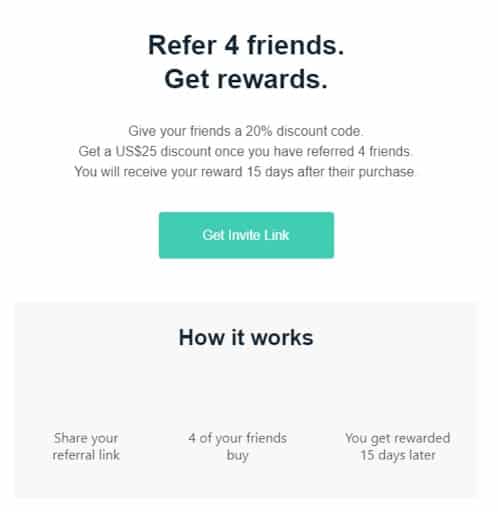
2. Cash rewards = for maximum motivation
Cash is a practical and valuable reward that customers can use daily. Money – in big or small amounts – can motivate customers to receive their friends. As a bonus, it is also scalable – your brand advocates can quickly figure out how much they’ll get for referring five friends, ten friends, or even 100 followers.
The Meat N’ Bone referral program encourages brand advocates to refer friends in exchange for points. These points can help with accumulating cash rewards. So, the more friends you refer, the more cash you’ll get.
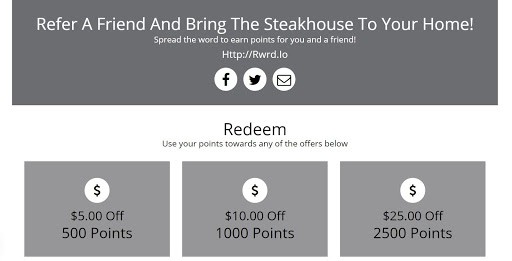
Interestingly, more than 70% of their customers interact with their referral program, which helped them immensely to spread the word about their business.
3. Free month = fostering loyalty
For businesses utilising a subscription model, a free month is also an appealing referral reward and a compelling SaaS marketing strategy. Besides getting a new customer, it will also enable brand advocates to develop a habit of using your products or services.
Evernote’s referral program encourages users to invite friends so they can use the app’s premium version. The more friends they refer, the more free months they’ll get.
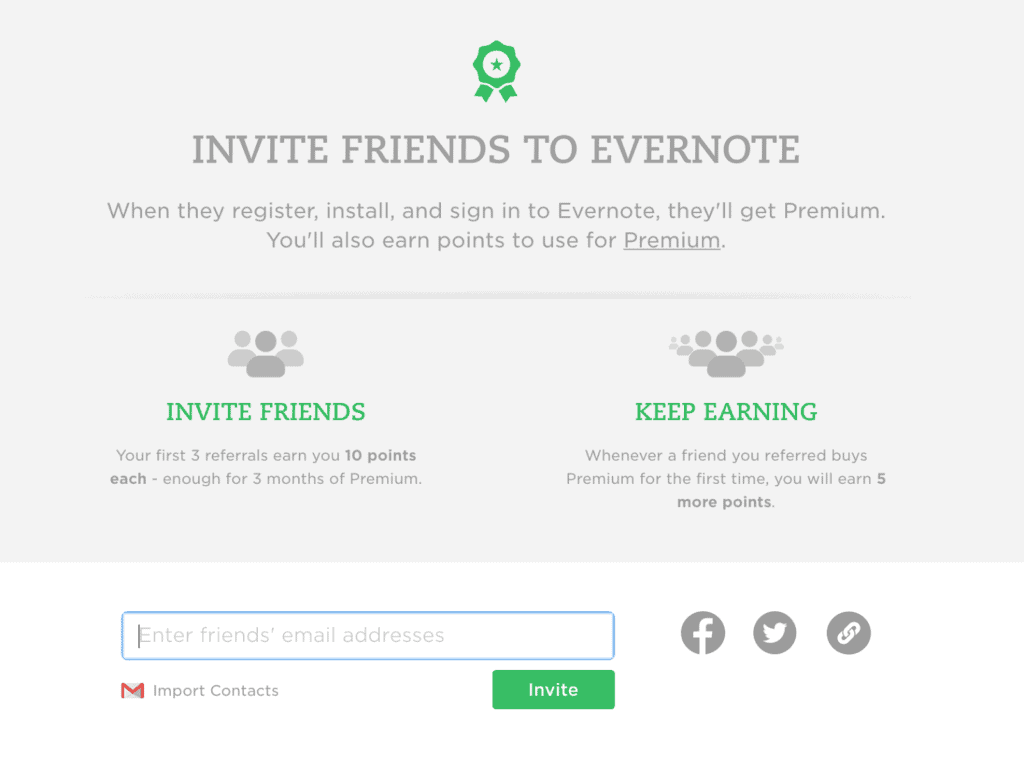
The referral program fosters customer loyalty by getting brand advocates used to the premium features of Evernote. Once their free subscription period expires, they’ll likely opt to pay for the app.
4. Custom rewards = special customer experience
Custom rewards motivate consumers by allowing them to snag an exclusive product that they won’t find anywhere else. It could include a special gift, a unique experience, or an autographed music album.
The Riff Raff & Co – a toy store for babies and toddlers – enables parents to get a free toy for their kids by successfully referring five friends to use their product. The prospect of getting a free toy is highly motivating for parents that want to put a smile on their kid’s face.
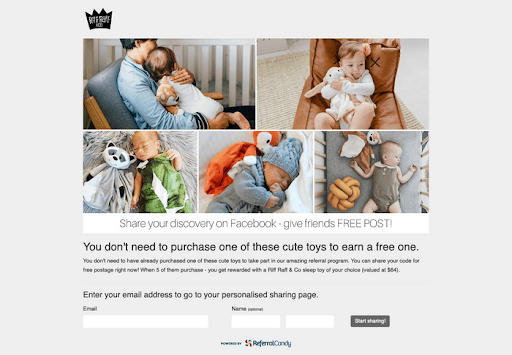
By providing an exclusive product or service, brand advocates can gain a unique customer experience that will encourage them to keep patronising the brand.
How to start your referral program?
Launching a referral program can have a significant impact on your customer acquisition and revenue. Referral rewards such as discounts, cash rewards, exclusive products, and free subscriptions can also have exciting benefits to purchasing behavior.
If you’re looking to launch your referral program, we highly recommend using ReferralCandy. Our app will enable you to launch your referral program within minutes.
About the author
Raul Galera is the Partner Manager at ReferralCandy, an e-commerce app that allows online brands to set up and run customer referral programs. Raul manages ReferralCandy’s agency program, where they help e-commerce agencies boost their clients’ sales through word-of-mouth.



